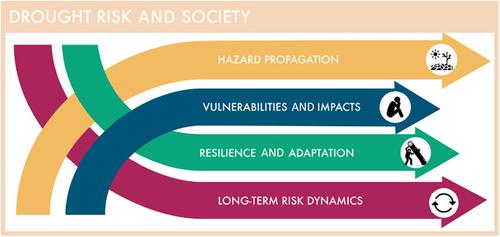当前位置:
X-MOL 学术
›
WIREs Clim. Chang.
›
论文详情
Our official English website, www.x-mol.net, welcomes your
feedback! (Note: you will need to create a separate account there.)
Drought and society: Scientific progress, blind spots, and future prospects
WIREs Climate Change ( IF 9.4 ) Pub Date : 2022-01-23 , DOI: 10.1002/wcc.761 Elisa Savelli 1, 2 , Maria Rusca 3 , Hannah Cloke 1, 2, 4, 5 , Giuliano Di Baldassarre 1, 2
WIREs Climate Change ( IF 9.4 ) Pub Date : 2022-01-23 , DOI: 10.1002/wcc.761 Elisa Savelli 1, 2 , Maria Rusca 3 , Hannah Cloke 1, 2, 4, 5 , Giuliano Di Baldassarre 1, 2
Affiliation

|
Human activities have increasingly intensified the severity, frequency, and negative impacts of droughts in several regions across the world. This trend has led to broader scientific conceptualizations of drought risk that account for human actions and their interplays with natural systems. This review focuses on physical and engineering sciences to examine the way and extent to which these disciplines account for social processes in relation to the production and distribution of drought risk. We conclude that this research has significantly progressed in terms of recognizing the role of humans in reshaping drought risk and its socioenvironmental impacts. We note an increasing engagement with and contribution to understanding vulnerability, resilience, and adaptation patterns. Moreover, by advancing (socio)hydrological models, developing numerical indexes, and enhancing data processing, physical and engineering scientists have determined the extent of human influences in the propagation of drought hazard. However, these studies do not fully capture the complexities of anthropogenic transformations. Very often, they portray society as homogeneous, and decision-making processes as apolitical, thereby concealing the power relations underlying the production of drought and the uneven distribution of its impacts. The resistance in engaging explicitly with politics and social power—despite their major role in producing anthropogenic drought—can be attributed to the strong influence of positivist epistemologies in engineering and physical sciences. We suggest that an active engagement with critical social sciences can further theorizations of drought risk by shedding light on the structural and historical systems of power that engender every socioenvironmental transformation.
中文翻译:

干旱与社会:科学进步、盲点和未来前景
人类活动日益加剧了全球多个地区干旱的严重性、频率和负面影响。这一趋势导致了更广泛的干旱风险科学概念化,这些概念化解释了人类行为及其与自然系统的相互作用。本综述侧重于物理和工程科学,以研究这些学科在解释与干旱风险的产生和分布相关的社会过程的方式和程度。我们得出的结论是,这项研究在认识到人类在重塑干旱风险及其社会环境影响方面的作用方面取得了重大进展。我们注意到越来越多的人参与并有助于理解脆弱性、复原力和适应模式。此外,通过推进(社会)水文模型,开发数值指数并加强数据处理,物理和工程科学家已经确定了人类对干旱灾害传播的影响程度。然而,这些研究并没有完全捕捉到人为转变的复杂性。很多时候,他们将社会描述为同质的,将决策过程描述为非政治性的,从而掩盖了干旱产生背后的权力关系及其影响的不均匀分布。明确参与政治和社会权力的阻力——尽管它们在造成人为干旱方面发挥了重要作用——可以归因于实证主义认识论在工程和物理科学中的强大影响。
更新日期:2022-01-23
中文翻译:

干旱与社会:科学进步、盲点和未来前景
人类活动日益加剧了全球多个地区干旱的严重性、频率和负面影响。这一趋势导致了更广泛的干旱风险科学概念化,这些概念化解释了人类行为及其与自然系统的相互作用。本综述侧重于物理和工程科学,以研究这些学科在解释与干旱风险的产生和分布相关的社会过程的方式和程度。我们得出的结论是,这项研究在认识到人类在重塑干旱风险及其社会环境影响方面的作用方面取得了重大进展。我们注意到越来越多的人参与并有助于理解脆弱性、复原力和适应模式。此外,通过推进(社会)水文模型,开发数值指数并加强数据处理,物理和工程科学家已经确定了人类对干旱灾害传播的影响程度。然而,这些研究并没有完全捕捉到人为转变的复杂性。很多时候,他们将社会描述为同质的,将决策过程描述为非政治性的,从而掩盖了干旱产生背后的权力关系及其影响的不均匀分布。明确参与政治和社会权力的阻力——尽管它们在造成人为干旱方面发挥了重要作用——可以归因于实证主义认识论在工程和物理科学中的强大影响。











































 京公网安备 11010802027423号
京公网安备 11010802027423号